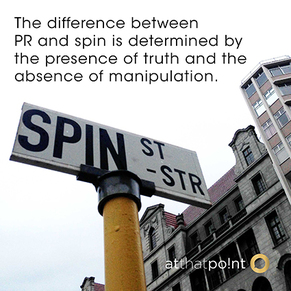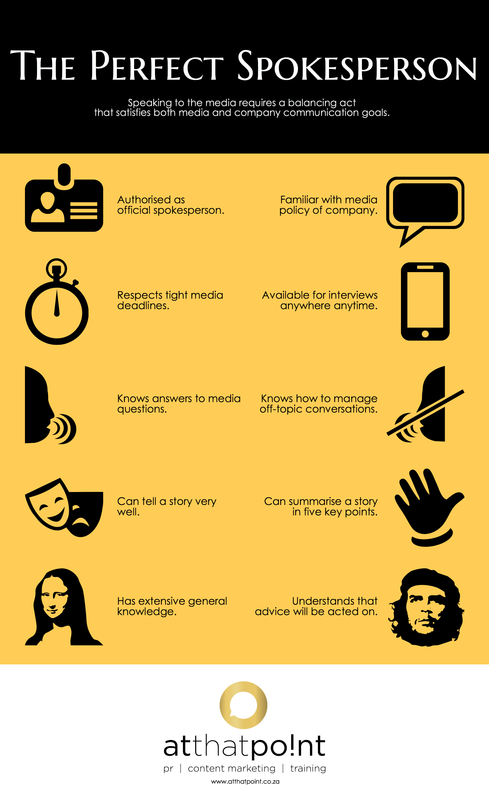|
We are very lucky to have clients that are incredibly well-informed and passionate about not only their own products and services, but also about what is happening in their industry and the world around them.
For any company aiming to create fortune through fame it is necessary to appoint as spokesperson someone with a unique set of skills. The Edelman Trust Barometer most recently indicated that the most trusted source of information is becoming "people like me" and it might therefore not be the best idea to appoint the CEO as spokesperson, especially if said CEO is uncomfortable with any of the below requirements.
0 Comments
 If you like stability, predictability and control, public relations (PR) might not be the best career choice for you. Why is it then that the PR industry filled to the brim with type-A personalities who are absolutely brilliant at what they do? In one word: influence. The well-known Serenity Prayer includes a plea for strength to accept the things we cannot change and the courage to change the things we can. PR professionals tend to ignore the first bit, and hold on for dear life to the “change what I can” bit ... and as tightly to our smartphones. Although the PR industry can’t, on behalf of their clients, force people to buy/vote/attend/#selfie (for that is called sales*), and although the PR industry can’t bombard people with messages that eventually make them buy/vote/attend/#selfie out of pure desperation to get rid of the message (for that is called advertising*), what the PR industry can do very effectively is influence. Now, just to make one thing very clear, by influencing I do not under any circumstances promote/advise/condone/like manipulation. My team and I firmly believe that there is a massive difference between PR and so-called spin. The stuff that gets the PR industry excited (publicity results, target market behaviours, reputation and perception changes, conversion rates etc) are all based on decisions by people who are soundly unaware of the goals and objectives neatly mapped out in a PR programme or campaign plan. It hasn’t mattered in quite some time what a company says about itself, but rather what employees and customers who deal with the company say to anyone who is willing to listen. People have become savvy to the marketing game, making it immensely difficult to break through the content cluttering our email inboxes and social media newsfeeds. Except when people WANT to know. Usually when people want to know something, they are prepared to spend time on finding and understanding information. And they prefer information in a format they can easily understand, such as stories about brands told by their friends or the media. Which is where influence enters the fray. PR professionals worth their salt do not influence the truth; that is called lying. They do not influence people, as that could easily, in this context, border on manipulation. PR professionals who understand that content is king work hard at influencing the entire communication process to balance their client’s expectations, goals and requirements with newsroom and other distributor needs in order to deliver the best possible stories in a timely and engaging manner to keep people returning for more. In short, true PR professionals enable those who would like to spread the word, to do so easily and accurately. A relentless drive for digging deep to get to the story behind the client brief, and finding a visual and a voice that can tell (not sell) that story to those who are desperate for content that doesn’t play the bait-and-switch game, and providing that information in a neat package to a customer or media practitioner ... THAT is how PR professionals can use their multitude of skills to keep clients happy, build trust with newsrooms, and keep the PR industry alive. Gone are the days where “lunching the press”, sending cheap gimmicky desk toys (or expensive bottles of imported anything), and press conferences that could’ve been covered with a simple media release. Gone are the days of the celebrity CEO, and even the celebrity brand, where everyone published everything just because. If you like life easy, don’t get into PR. If you don’t mind a fanatical dedication to learning, developing new skills on the go, and figuring out every single situation on its own merit in order to influence what you can, then this industry is the place to #LoveThisJob *Disclaimer: I have the utmost respect for both the sales and advertising professions, for both are practiced by some of the most hard-working, creative, tough nut people I know. The mentions in the article of the respective professions are therefore merely used as a tongue-in-cheek way of crudely explaining the differences between the verticals of the wonderful world of marketing.  When I was still deciding what to study (leaning heavily towards graphic design at that stage), a friend suggested I phone a friend of theirs who had experience in the PR field. Never having heard of PR (public relations) but curious enough, I phoned, and a long story short am now writing this blog post at the other side of 10 years in the industry. After 10 years, there is one thing that I still wish that friend of a friend told me (not that it would've made any difference in my choice or career satisfaction). The greatest skill and PR professional can have/learn/build is balance. Balancing a client's wishes, objectives and preferences with those of the media is something that can not be taught by even the finest schools. Doing it all at a frantic pace with a journalist chasing a deadline just 10 minutes away, the client about to board a plane for a three hour flight, your cellphone battery bleeping for dear life, and simultaneously thinking of three backup plans at the same time isn't stressful, it's natural ... if you're in PR. Some days in PR are rewarded by having checked all the boxes (loads of quality publicity generated, happy clients, grateful and trusting journalists) and some days you have to let go with a hopeful "maybe next time". Some days it is as if you know your clients' diaries and movements better than their PAs and spouses, and some days you just keep on missing out on the crucial three minutes a journalist wanted for an all-important interview that would've included your clients' name in the biggest story of the year. Some days you feel like you've really cracked this hardball industry by knowing and working your stuff, and some days you just end up at home on the couch with a bag of chips and a box of chocolates. All to get back to the office the next day (for those PR pros who can wait that long to check e-mails) and try once again to achieve the fine balance necessary to succeed in this ever-changing industry. I worry sometimes that clients will think that I'm only pushing publicity for the sake of submitting a brilliant report at the end of the month, or whether journalists will think that they're talking to the "PR poppie" who doesn't want to help. I worry that by using common sense (leaning in favour of either the client or the newsroom) that I'm damaging the trust relationships we work so hard to build and nurture, or confirming the negative perception of the PR industry held by many. In the end it all boils down to doing your best each and every single second of each and every single day to achieve a balance that will build towards a greater good for your client, your media network, and the public who are at the receiving end of the stories told by both brand and traditional journalists alike. |
Archives
November 2020
Categories
All
|


 RSS Feed
RSS Feed